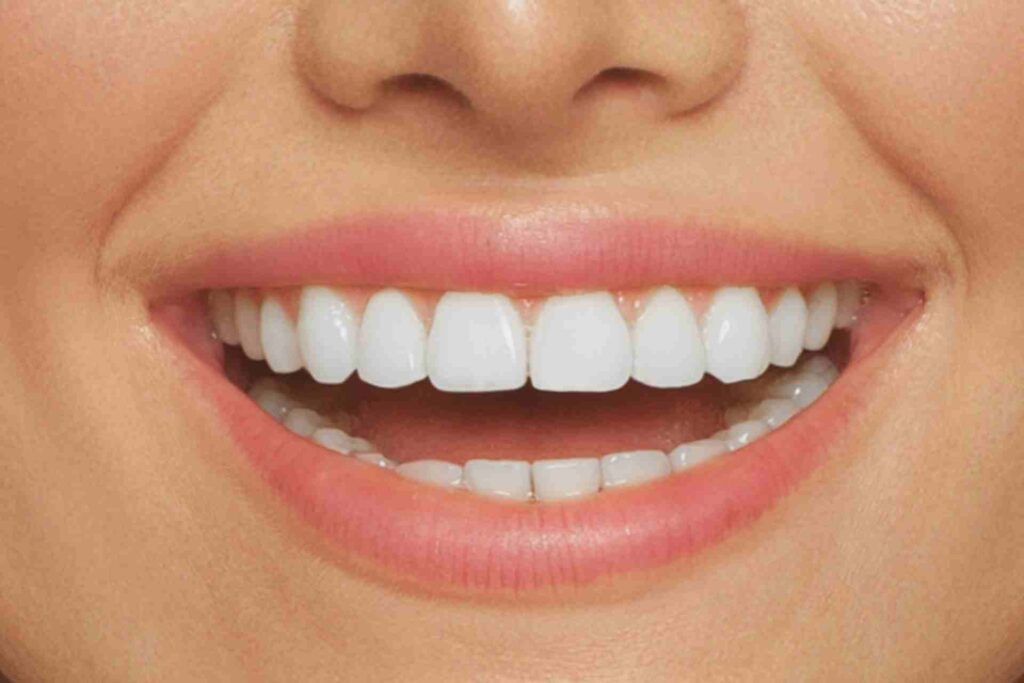Highlights:
- Thinning enamel makes teeth look translucent, weak, and more sensitive.
- Common causes include acid erosion, teeth grinding, aggressive brushing, genetics, and aging.
- Signs to watch for: see-through edges, sensitivity, rough texture, yellowing, and chipping.
- Enamel can’t grow back, but you can strengthen and protect what’s left.
- Prevent further thinning by using remineralizing toothpaste, adjusting your diet, wearing a night guard, and brushing gently.
- See a dentist if your teeth become more sensitive, fragile, or start chipping easily.
Have you noticed your teeth looking more translucent or fragile? If so, you might be experiencing enamel thinning.
Enamel is the hard outer layer of your teeth. Its role is to protect them from damage. However, once it starts to wear down, your teeth can become:
- more sensitive
- weak
- prone to chipping
The good news? While enamel can’t grow back, there are ways to strengthen and protect your teeth. In this guide, we’ll explore the causes of thin teeth, how to prevent further enamel loss and the best treatments to keep your smile strong and healthy.
What Are Thin Teeth?

Do your teeth seem see-through at the edges? Or maybe they feel more sensitive than they used to? That could be a sign of thinning enamel.
Enamel is the super-strong outer layer of your teeth, acting like armor to protect them from daily wear and tear. But once it starts to thin out, your teeth become more fragile, sensitive, and even change in appearance.
And here’s the catch—enamel doesn’t grow back. That’s why it’s so important to catch the early signs and take action before it leads to bigger issues.
Signs Your Teeth May Be Thinning
- Translucent edges – Teeth look glassy or slightly see-through.
- Increased sensitivity – Hot coffee, cold drinks, and sweet foods make you wince.
- Rough or uneven texture – Teeth feel worn down or gritty.
- Yellowing – As enamel thins, the darker dentin underneath starts to show.
- Chipping or cracking – Teeth seem weaker and more prone to breaking.
Sound familiar? Don’t worry—you’re not alone, and there are ways to protect and strengthen your teeth.
Let’s see what causes enamel thinning and how you can stop it in its tracks!
What Causes Thin Teeth?
Acid Erosion
One of the biggest culprits is acid erosion—when acids slowly wear away your enamel, making your teeth weaker over time. And the tricky part? This can happen from both what you eat and what’s happening inside your body.
Enamel is strong, but it’s not invincible. When it’s exposed to acid frequently, it starts to dissolve—kind of like how sugar melts in water.
Here’s how acid erosion happens:
Too many acidic foods & drinks – Citrus fruits, soda, wine, vinegar-based dressings… sound familiar? These all weaken enamel with repeated exposure.
Acid reflux (GERD) – Stomach acid creeping up into your mouth? Yikes. This can seriously damage your teeth over time.
Dry mouth (aka low saliva production) – Saliva helps wash away acids and protect enamel. If you have a dry mouth (from medications, dehydration, or certain health conditions), your teeth may be at higher risk for thinning.
Acid erosion happens gradually, so you may not notice it right away. But once the enamel is gone, it’s gone for good. That’s why it’s key to limit acid exposure and take steps to protect your teeth now!
Teeth Grinding (Bruxism)

Do you ever wake up with a sore jaw or sensitive teeth? You might be grinding your teeth at night without even realizing it!
Bruxism—aka teeth grinding and clenching—puts a ton of pressure on your enamel. Over time, this constant grinding can wear down the protective layer of your teeth, making them thinner, more sensitive, and even more prone to chipping.
How bruxism thins your enamel:
- The friction from teeth rubbing together gradually wears down the outer layer.
- Clenching your teeth tightly can cause microfractures in enamel.
- Thinner enamel = more discomfort from hot, cold, and sweet foods.
Many people grind their teeth without knowing it, particularly at night. If you wake up with jaw pain, headaches, or notice your teeth looking flatter or shorter, it might be time to talk to your dentist about a night guard!
Aggressive Brushing
Can you brush your enamel away?
Brushing is supposed to protect your teeth, right? Well… not if you’re brushing too hard or using the wrong toothbrush.
Many people think that scrubbing harder means cleaner teeth. But in reality, aggressive brushing can actually wear down enamel over time. It’s like sanding down a delicate surface—you’re slowly stripping away that protective layer.
Enamel-damaging brushing habits:
- Using a hard-bristled toothbrush may feel like “deep-cleaning,” but it’s too rough on enamel.
- Brushing too forcefully doesn’t remove stains; it removes enamel.
- Brushing right after eating can wear enamel down faster.
The fix? Use a soft-bristled toothbrush, brush gently in circular motions, and wait at least 30 minutes after eating before brushing. Especially if you’ve had something acidic. Your enamel will thank you!
Genetic Factors
Sometimes, thin teeth aren’t caused by what you eat or how you brush—it’s just in your DNA.
Some people are simply born with naturally thinner enamel. This makes their teeth more prone to sensitivity, translucency, and erosion over time. If your parents or siblings have thin teeth, chances are, you might too.
How genetics affect enamel thickness:
- Some people naturally have less enamel than others.
- Certain genetic conditions (like amelogenesis imperfecta) can cause weak or underdeveloped enamel.
- Your saliva composition—which helps protect enamel—can also be influenced by genetics.
If you have naturally thin enamel, that doesn’t mean you’re doomed to dental problems! You just need to be extra mindful of protecting your enamel with gentle brushing, remineralizing toothpaste, and regular dental checkups.
Age-Related Wear
As the years go by, even your teeth experience a bit of wear and tear. Age-related wear is a natural process where enamel gradually thins out over time. This isn’t necessarily a sign of poor oral care—it’s just part of the aging process.
Here’s what happens as you age:
- Daily habits, even with great care, can slowly wear down enamel.
- Thinner enamel may lead to heightened sensitivity to temperature changes and certain foods.
- With less enamel, your teeth can become more vulnerable to cavities and chipping.
Remember, while you can’t stop time, you can protect your smile! Keep your teeth strong, no matter your age.
When Should You See a Dentist?

Signs it’s time to see a dentist:
- Increased sensitivity
- Translucent or yellowing teeth
- Chipping, cracking, or rough edges
- Unexplained discomfort
Why Early Intervention Matters
- Prevents further enamel loss
- Protects against cavities & decay
- Avoids costly restorative treatments
If you’re seeing signs of thinning teeth, schedule a checkup! Your dentist can help create a plan to strengthen your enamel and keep your smile healthy for years.
How Can I Strengthen Thin Teeth?
Use Remineralizing Products
One of the best ways to fight enamel thinning is to remineralize your teeth—aka, replenish the lost minerals that keep enamel strong.
Fluoride toothpaste & mouthwash – Fluoride helps harden enamel and protect against acid attacks. Look for a high-fluoride toothpaste if you’re prone to sensitivity.
Hydroxyapatite toothpaste – A natural alternative to fluoride, hydroxyapatite actually mimics the minerals in enamel and can help rebuild weak spots.
Incorporating these into your routine can slow down enamel erosion and make your teeth more resistant to daily wear.
Adjust Your Diet
What you eat (and drink!) plays an enormous role in protecting your enamel. Certain foods can weaken it, while others help keep it strong.
Making small tweaks to your diet can go a long way in preventing further enamel loss.
Reduce acidic foods & drinks – Cut back on soda, citrus fruits, vinegar-based dressings, and wine. Acidic foods slowly erode enamel over time.
Drink water after acidic consumption – Had something acidic? Rinse your mouth with water right after to help neutralize acids and protect your enamel.
Eat calcium-rich foods – Calcium helps strengthen teeth from the inside out! Load up on dairy, leafy greens, almonds, and fortified plant-based milk.
Wear a Night Guard
If you grind your teeth at night (and don’t even realize it), a night guard can be a game changer for protecting your enamel.
- Prevents grinding damage
- Reduces jaw strain
- Custom-fit means the best protection
If you wake up with jaw pain or headaches or notice flattened teeth, talk to your dentist about getting a night guard—it’s one of the easiest ways to protect your enamel!
Use a Soft-Bristled Toothbrush

Brushing too hard can actually wear down your enamel—especially if you’re using a hard-bristled toothbrush. The solution? Switch to a soft-bristled brush, and be gentle!
- Soft bristles equal less abrasion
- Use gentle, circular motions
- Brush for 2 minutes twice a day
Brushing should protect your teeth, not wear them down. A simple switch to a soft-bristled toothbrush keeps your enamel strong!
Consider Dental Treatments
If your enamel is already significantly thinned, professional dental treatments can help restore and protect your teeth.
- Bonding involves applying a tooth-colored resin to add protection and enhance strength.
- Veneers are thin porcelain or composite shells that cover the front of your teeth to improve their appearance and durability.
- Crowns provide full coverage and long-term protection for severely worn teeth.
Your dentist can recommend the best option based on how much enamel loss you have. These treatments improve appearance and protect your teeth from further damage!
How Can I Prevent Enamel Thinning?
The best way to manage thinning teeth is to prevent further enamel loss. While you can’t regrow enamel, you can take steps to strengthen and protect what’s left.
Start by brushing gently with fluoride or hydroxyapatite toothpaste. Fluoride helps remineralize weakened enamel, while hydroxyapatite is a natural alternative that mimics enamel minerals.
As mentioned earlier, the key is to brush with a soft-bristled toothbrush using light pressure—scrubbing too hard can do more harm than good.
If you drink acidic beverages like coffee, soda, or citrus juices, use a straw to minimize direct contact with your teeth. This simple trick helps reduce acid exposure and slows down enamel erosion over time.
Staying hydrated is also critical. Saliva is your body’s natural defense against enamel erosion. It helps wash away acids and bacteria. Drink plenty of water throughout the day to keep saliva production at healthy levels, especially if you struggle with dry mouth.
Finally, avoid habits that can wear down enamel even faster. Chewing ice, biting nails, and using your teeth as tools (like opening packages) can create micro-cracks, making your teeth even more vulnerable.
Key Takeaways
- Thin teeth result from enamel loss, leading to sensitivity and fragility
- Acidic foods, grinding, and aggressive brushing contribute to thinning
- Strengthen teeth with remineralizing products, diet changes, and protective treatments
- Prevent further thinning with proper oral care and professional treatments
Follow @joycethedentist for expert tips on protecting and strengthening your smile!
FAQs
Can stress make my teeth thinner?
Yes, stress can certainly lead to teeth grinding (bruxism), which wears down enamel over time.
Do whitening treatments make thin teeth worse?
Yes, some whitening products can increase sensitivity if your enamel is already thin. Talk to your dentist before using them.
Can orthodontic treatments (braces, Invisalign) cause enamel thinning?
No, but poor oral hygiene during treatment can lead to enamel erosion, especially if plaque builds up around brackets or aligners.
Are thin teeth more likely to stain?
Yes, thinner enamel exposes more dentin, which absorbs stains more easily than enamel.
Does drinking carbonated water (sparkling water) contribute to enamel thinning?
No, plain sparkling water is far less acidic than soda, but flavored versions with citric acid can contribute to erosion over time.
Can oil pulling help strengthen thin teeth?
No, oil pulling won’t restore enamel, but it may help with overall oral hygiene by reducing bacteria.
Is there a genetic test to determine if I have naturally thin enamel?
No specific test exists, but a dentist can assess your enamel thickness and tell if genetics play a role.
Can dental sealants help protect thin teeth?
Yes, sealants can add an extra layer of protection, especially on molars prone to wear.
Do dairy products really help strengthen enamel?
Yes, dairy is rich in calcium and phosphates, which help remineralize enamel and keep it strong.
Can overusing mouthwash damage enamel?
Yes, alcohol-based mouthwashes can dry out your mouth, reducing saliva and making enamel more vulnerable. Opt for an alcohol-free version instead.





















